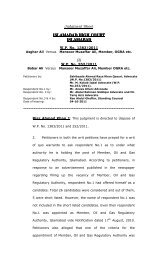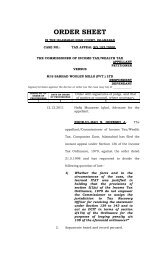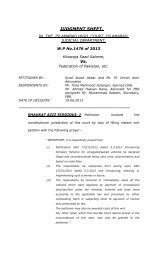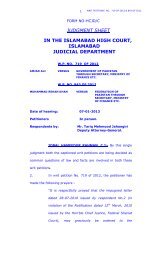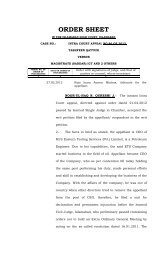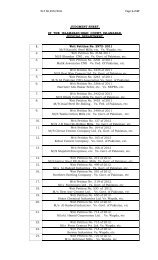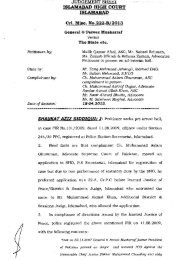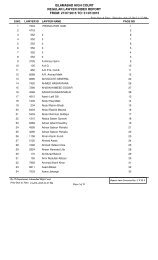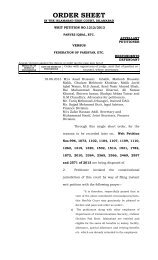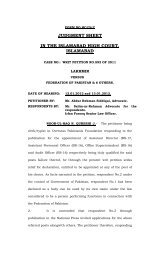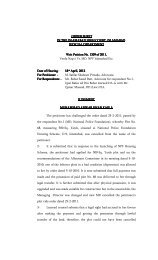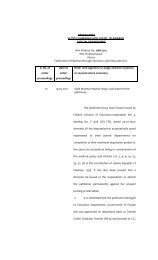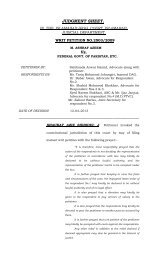ICA. 98-2010 - Islamabad High Court
ICA. 98-2010 - Islamabad High Court
ICA. 98-2010 - Islamabad High Court
Create successful ePaper yourself
Turn your PDF publications into a flip-book with our unique Google optimized e-Paper software.
JUDGMENT SHEETIN THE ISLAMABAD HIGH COURT,ISLAMABADCASE NO.: INTRA COURT APPEAL NO.<strong>98</strong> OF <strong>2010</strong>MAJOR (RTD.) MUHAMMAD FAROOQVERSUSCHAIRMAN, NATIONAL ACCOUNTABILITY BUREAU AND 3 OTHERS.DATE OF HEARING : 06.03.2012.APPELLANT BY : Mr. Muhammad Bashir Khan,Advocate.RESPONDENT BY : Mr. Nadeem Hasan, SeniorProsecutor, NAB.Zafar Minhas, Manager LegalPakistan Engineering CouncilMr. M. Imran Shaukat AccountsOfficer, AGPR.NOOR-UL-HAQ N. QURESHI J.- The instant Intra <strong>Court</strong>appeal, directed against order dated 30.06.<strong>2010</strong> passed by learnedSingle Judge in Chamber, dismissed the writ petition filed by theappellant/ petitioner.2. Brief facts as narrated in the appeal, appellant beingaggrieved by the departmental decision found no alternative andefficacious remedy, filed writ petition No.192/2008, which wasdismissed by learned Single Judge in Chamber vide order dated30.6.<strong>2010</strong>.3. Against decision of <strong>Islamabad</strong> <strong>High</strong> <strong>Court</strong>, civil petitionNo.1604 of 2009, was preferred to the Hon’ble Supreme <strong>Court</strong> ofPakistan, passed the order observing proviso 1 of Section 3 Sub-section2 of Law Reforms Ordinance, 1972, remedy of Intra <strong>Court</strong> Appeal in thefirst instance has to be preferred. Therefore, such petition was notpressed with a view to file Intra <strong>Court</strong> appeal, however, Hon’ble
<strong>ICA</strong> No.<strong>98</strong> of <strong>2010</strong>- 2 –Supreme <strong>Court</strong> observed in case of filing appeal, <strong>High</strong> <strong>Court</strong> mayconsider filing of petition while deciding question of delay.4. On filing <strong>ICA</strong>, briefly stated the facts, whereby appellantjoined Pak Army, wherefrom retired as Major in 1995, joined PakistanEngineering Council, a statutory body under Pakistan EngineeringCouncil Act, 1976 controlled by Government of Pakistan, as a regularemployee as Deputy Registrar in Grade-19 having been selected in openmerit.5. The appellant performed duties upto his selection asAdditional Director Grade-19 in National Accountability Bureau in openmerit competition, therefore, he joined on the same day with effect from29.5.2004, relieved from Pakistan Engineering Council without anybreak in service. P.E.C. issued a formal NOC for joining newassignment. Therefore, service being continued from one department toother department.6. Since the terms and conditions of service of appellantgoverned by Section 28 of National Accountability Ordinance, 1999 andconditions of Service Rules, 2002 as per Section 28(d), the Civil ServantAct, 1973 do not apply to NAB employees.7. The appellant was entitled to protection of previous pay andcounting of service rendered by him in previous department, which onrefusal by National Accountability Bureau, he preferred the writpetition. Failure to seek relief, he preferred the instant Intra <strong>Court</strong>Appeal.8. Learned counsel for the appellant argued that terms ofoffice and powers and duties of the Registrar and other officers andservants of the Council are protected by Section 25 of the Ordinance ofPakistan Engineering Council on its promulgation in the year 1976.
<strong>ICA</strong> No.<strong>98</strong> of <strong>2010</strong>- 3 –Also, he referred Bye-laws of the Pakistan Engineering Council of 1976,which have been published in official Gazette dated 21.12.1976, assuch, the learned Single Judge in Chamber has ignored such legalaspect. He drawn our attention towards decision of the Hon’ble Lahore<strong>High</strong> <strong>Court</strong> in case of “Ahmad Mumtaz Bajwa Vs. NAB etc.”, whereby inview of section 28(d) of the NAB Ordinance, 1999 has been discussedand observed that Civil Servant Acts, 1973 shall not be applicable to thepersons appointed in NAB according to the said provision. He alsoreferred the comments submitted by respondents, wherein the officememorandum No.F.4(2)R-2/96, dated 12.8.2002 at Para-3, which hasbeen further substituted by OM No.4(2)R-2/1996-235/<strong>2010</strong>, dated08.6.<strong>2010</strong>, whereby benefit of protection of pay to the employees ofAutonomous Bodies on their subsequent appointment in governmentservice is safe guarded.9. Such substitution has been concealed by the departmentwhile submitted their comments has not taken into consideration,hence, said office memorandum in view of scheme of law as referredabove, the appellant is entitled of his pay protection and previous lengthof service to be counted by the NAB Authorities.10. He while drawing attention to the prayer clause lastlydrawn in Pakistan Engineering Council amounting to Rs.20,395/-,which is requested to be protected till date with all back benefits so alsoservices rendered by him to be counted for the purpose of promotionand pension. In support of his arguments, he relied upon “2000 PSC50” (Nafees Ahmad Vs. Government of Pakistan and others),deciding the question of pensionary benefits drawn and inference fromPensionary Rules for Drawing and Disbursing Officers Rules 9.6(v)Chap IX is binding upon the respondents. In the said case, protection of
<strong>ICA</strong> No.<strong>98</strong> of <strong>2010</strong>- 4 –pay and counting of period of service within two governmentfunctionaries was considered, on failure to seek remedy from theTribunal. Another case law referred reported in “19<strong>98</strong> SCMR 1442(Majid Hussain Vs. Secretary, Finance Division, Ministry ofFinance and 2 others)”, to enunciate the principle while consideringthe status of the employee as a Civil Servant, therefore, entitled toinvoke F.R. 22(A)(i) for protection of salary, which he was drawing inhis parent department. Again an issue decided respecting a civil servanton his joining of other department, in between two departments byconsidering the rules applied. The case law reported in “2008 SCMR14 (Syed Abdus Samad Pirzada Vs. Government of Punjab throughFinance Department and another), which learned counsel for theappellant relied upon, wherein employee on leaving corporation, joinedEducation Department through Public Service Commission and throughproper channel applied, thus was observed to be entitled to protectionof his last pay from joining in Education Department. The crucialitiesdiscussed are change of service through applying proper channel. Theauthority referred in support of contention raised by learned counsel forthe appellant is “NLR 2011 Service 13 (Chairman CBR and othersVs. Nawab Khan), whereby Hon’ble Supreme <strong>Court</strong> while discussingthe concerned civil servant relinquished his lien in autonomous bodyand no service break between his resignation,, which as a result ofgrant of relief by the Service Tribunal, assailing the same by theDepartment leave to appeal was declined.11. Learned counsel for the respondent/NAB argued that allpay and allowances admissible to the appellant under the rulesincluding gratuity, leave encashment, and CP Fund were already paid tohim by Pakistan Engineering Counsel at the time of leaving service. As
<strong>ICA</strong> No.<strong>98</strong> of <strong>2010</strong>- 5 –such, he is not entitled for pay protection or even length of servicemainly on following grounds:-(a) The appellant has already drawn his serviceemoluments from his earlier department i.e. PakistanEngineering council.(b) As per own admission of the appellant that CivilServants Act would not apply, therefore, he cannot betermed as civil servant, as such, cannot seek suchrelief under the relevant provision applied to the civilservant.(c) He has not applied through proper channel, such reliefcannot be granted to him by the answeringrespondent/NAB.(d) He has not produced any such proof, which he isrequired to submit respecting previous service.(e) The department concerned i.e. previous departmenthas to be a consented part for relief sought, failuretherefore, such a relief cannot be accorded.12. Learned counsel for the respondent while relying upon“2011 PLC (CS) 1175 (Akbar Shah Vs. Securities and Exchangecommission of Pakistan through Chairman)”, emphasized that nosuch certificate has been produced by the appellant, therefore, he wasnot qualified for any relief claimed.13. Learned counsel for the respondent also argued that Intra<strong>Court</strong> Appeal when in view of facts on record providing no anyfavourable relief, same cannot be maintained through <strong>ICA</strong>. In support ofsuch view, he relied upon “2004 MLD 1615 (Agha Abdur RahmanKhan and others Vs. Managing Director, Cholistan DevelopmentAuthority, Bahawalpur)’ and “<strong>2010</strong> MLD 1550 (Muhammad MunirAbdullah Vs. T.M.A and another)”.14. We have heard the argued and gone through the record.
<strong>ICA</strong> No.<strong>98</strong> of <strong>2010</strong>- 6 –15. Carefully reading of the main contention respecting officememorandum dated 08.6.<strong>2010</strong>, whereby, earlier office memorandum of2002 was substituted, which has been made basis for seeking reliefthrough the instant appeal. The substituted memorandum isreproduced hereunder:-“The benefit of protection of pay to the employees ofautonomous bodies on their subsequent appointment ingovernment service is not admissible as the employees ofautonomous bodies are not civil servant within the meaningof Civil Servant Act, 1973. However, the benefit of payprotection will be admissible to employees of suchautonomous organizations who have adopted Scheme ofBasic Pay Scales in toto on their appointment in Governmentoffices provided they have applied for the post throughproper channel.”16. While referring such substitution, it is very important tonote that there is a condition provided that benefit of pay protection willbe admissible to the employees of such autonomous organizations, whohave adopted Scheme of basic pay scales in toto on their appointmentin government offices provided they have applied for the post throughproper channel.17. Leaving aside the crucially argued by learned counsel forthe respondent/NAB, we are constrained to emphasize as to whetherappellant applied through proper channel, which on preferring eitherthe petition or document submitted in support thereof. No where suchcondition is seems to have been complied with by the appellant.18. Another very important latter dated 31.6.2006 issued bythe Finance Division, Regulations Wing through Section officer,communicated to Assistant Director NAB discusses, that since both thedepartments are autonomous bodies established through an Ordinance
<strong>ICA</strong> No.<strong>98</strong> of <strong>2010</strong>- 7 –and the appellant has joined one autonomous body, having beenrelieved from other autonomous body, therefore, fixation of pay bedecided in the light of their own policy and service rules.19. Otherwise, there is no other ground available to theappellant even in view of his own assertion that Civil Servants Act doesnot apply, hence, the relevant law and rules are also not applicable tohim, therefore, he cannot claim benefit whereof.20. More to that when the appellant has not applied throughproper channel the new posting, how he can get benefit of the officememorandum dated 08.6,.<strong>2010</strong>, which cannot be pressed in service infavour of those, who did not apply for the post through proper channel.21. No any such policy or rules of any of the autonomous bodyeither leaving or joining is discussed by the appellant through suchscheme of law, he is entitled to seek relief, failure thereof totallydisentitle the appellant from seeking such a relief.22. In the light of above discussion, this Intra <strong>Court</strong> Appeal isdevoid of any force, the impugned order dated 30.6.2009 passed by thelearned Single Judge of this <strong>Court</strong> does not suffer from any illegality orinfirmity, therefore, the instant <strong>ICA</strong> is dismissed and order passed bythe learned Single Judge of this <strong>Court</strong> in Chamber, is upheld. Partiesare left to bear their own costs.*AR.ANSARI/(CHIEF JUSTICE)(NOOR-UL-HAQ N. QURESHI)JUDGEAPPROVED FOR REPORTING



